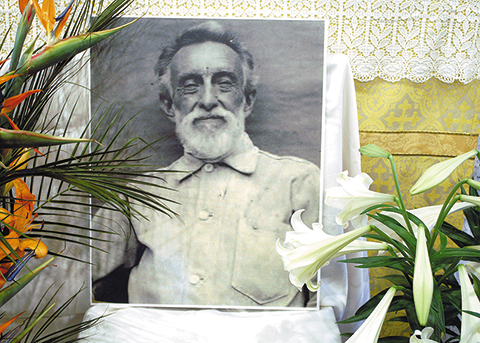
The cause for the canonization of Brother Joseph Dutton was recently opened.
An area Civil War history enthusiast, Pete Skelly, has collected considerable knowledge of his life and was happy to share.
Brother Joseph Dutton (then called Ira Dutton) was born in 1843 and grew up in Janesville.
He was a busy kid and teenager, eager to learn, participated in gymnastics, was an assistant editor for a local newspaper, worked at a bookstore, volunteered as a fireman and militiaman — the list goes on.
In 1861, when he was 18, Dutton responded to the start of the Civil War by joining the Union army along with the other local militiamen. He became part of the 13th Wisconsin Infantry.
After only two years, he was made district quartermaster, overseeing 20 million dollars worth of supplies and equipment, and assisting with the escape of former slaves.
When the war was over, Dutton remained in the South, taking a challenging job searching for the lost bodies of soldiers.
In the midst of this task, Dutton suffered a personal tragedy. He had married a young woman whom he admitted was a “rescue project,” and unfortunately it didn’t end well. She left him after less than a year for another man.
It was at this point that he entered what he would later term his “degenerate decade.”
Bouncing from place to place throughout the southern United States, he ended up working in a distillery, and, as Skelly put it, “sampling a few too many of his own wares.”
He was a functional alcoholic for several years, and he began to question the meaning of his life — what was the purpose?
Saintly life
His search for meaning led him to try several religions, but Catholicism was the one that answered the hunger in his heart.
He was Baptized at the age of 40 and took the name Joseph.
He initially considered joining the Trappists and did live with them for a year and a half.
However, he ultimately discerned that that was not his path, and in fact, he was working for a church in New Orleans when he discovered his calling.
He read in a local newspaper about the work of Fr. (now St.) Damien of Molokai.
He felt that this was what he had been waiting for. He sought out the writer of the piece for more information and then booked a passage to Hawaii.
When he arrived, completely unannounced, he told Father Damien that he was Joseph Dutton and he wanted to help.
Father Damien welcomed him, and said from then on he would be called “brother”.
This title was indeed used for the rest of his life, although Brother Dutton never formally took vows in a Religious Order.
After years of constant movement around the country, Brother Dutton had finally found a reason to be still — he served in the leper colony for the next 40 years, leaving the place only three times in that entire period.
He used to describe his motivation as penance; he referred to a particularly grave sin in his past, which he considered this life an act of repentance for.
God’s mercy used Brother Dutton’s repentance to bring about great good.
He had charge of the orphanage on the island, and in between that busy labor, he was also a prolific letter writer.
His many talents — discovered even when he was young — were put to great use for the sake of the souls on the island of Molokai.
Despite living for those years in what was then a foreign country (Hawaii had not yet become a state), he always remained closely tied to his home in Wisconsin.
In addition to writing letters back home, he would fly the Grand Army of the Republic flag every year after their reunion.
In fact, the statue of him that stands today in Molokai is a statue of him as a young Civil War veteran.
His ties to particular individuals remained important as well.
At one point, his former boss in the Janesville bookstore had to refute a rumor that he had died of leprosy. He was in fact still alive and well and had recently written.
Dutton finally left the island in 1931, due to his declining health, and died that same year.
Cause for canonization
Even within his lifetime, Brother Dutton had attained a fairly wide degree of fame.
Something of a “Mother Theresa of his time,” he was also a “touch of a self-promoter” (for the sake of his boys in the orphanage.)
In his lifetime, many presidents knew of him. He wrote to President Woodrow Wilson at the start of World War I that he was happy to bring back some of his fellow members of the 13th to serve as sharpshooters. (He was at this point in his 70s, so the president politely declined.)
Theodore Roosevelt had also written to him and instructed the new Navy fleet to dip the flags in his honor when they went by the island.
The Brother Dutton School in Beloit was even named in his lifetime.
Given this degree of public knowledge, it’s no surprise that his cause for canonization was initiated in the diocese in Hawaii where he is best known.
The Brother Dutton Guild, founded in Hawaii, seeks to promote his life story in order to progress his cause and to encourage others to follow his example, including those of us in Wisconsin where he was raised.
His local connection and inspiring life are what encouraged Stephen Skelly, Pete’s cousin, to bring him to the attention of his Knights of Columbus council, and the Catholic Herald as well.
Brother Dutton’s letters are at the Wisconsin Veterans’ Museum, and although Janesville has yet to memorialize him, his story is certainly worth sharing.
Prayer cards for the promotion of his cause for canonization can be found on the guild’s website at josephdutton.org

